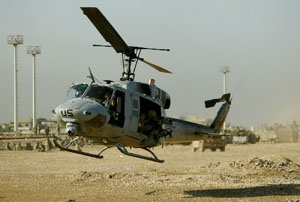 |
Saturday, February 24, 2007
Iraqi journalists union demands apology
BAGHDAD, Iraq - The Iraqi Union for Journalists said Friday it has demanded an apology and compensation for a U.S.-led raid on the group's headquarters this week. The U.S. military insisted American troops were not involved.
LinkHere
Iraqis Withdrawing From Banks
THE WASHINGTON TIMES
February 23, 2007
BAGHDAD -- There is nothing routine about a trip to the bank in Baghdad.
Confronted by criminal gangs on the streets and demands for bribes from tellers in the branches -- not to mention long lines, shortages of bank notes, and other inconveniences -- many Iraqis are opting simply to keep their savings at home.
Even without the security concerns, financiers and government officials say, there are not enough banks in Iraq to serve the population and finance sorely needed reconstruction, leaving companies and individuals struggling to secure their assets.
"You must keep it somewhere," said Abd Ali Radi, the 56-year-old owner of a modest bus company. "This is a problem for all Iraqis today."
Interviewed in a restaurant last month, Mr. Radi recalled a recent trip to his bank in which, while nervously edging ahead in line, he heard the familiar sound of an ammunition round being injected into the chamber of an automatic pistol. He quickly fled.
Ali Al-Ajeely, a 48-year-old travel agency owner, said he is so fearful of carrying large amounts of cash that he avoids the city's depositories altogether. "It's safer to stay away from the banks," he said.
And businessman Hamza Own, a 47-year-old waterworks contractor, called the banks insecure and inefficient. "I have better ways of storing my money," he said, adding he last held a bank account in 1990.
Several banks in Baghdad this year have suffered daylight heists in which millions of dollars were stolen from their main offices, branches and armored vehicles.
"Most banks handling cash have experienced large robberies -- a million here, another million there," said Foud M. Mustafa, the managing director of the Credit Bank of Iraq.
The robberies have forced some institutions to reduce the amount of cash they keep on hand. "Smaller is better now," said Zuhair Al-Hafidh, whose Ashur International Bank focuses on the investment sector.
Iraqi banks guarantee their deposits, but customers have few assurances while traveling to and from the institutions. And in a city where dozens of people are killed every day, many residents feel it is more practical to keep their savings at home.
"If anything happens to you, your family has the money," said Mr. Al-Ajeely, the travel agent.
"There are secrets about the fall of Baghdad which no one knows about yet,"
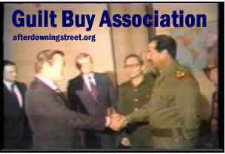
Georgie Big Big mistake I say, I have been waiting for all the little family secrets to come out, I declare this will be one of the biggest sellers of all time.
Iraqi kids play make-believe war games
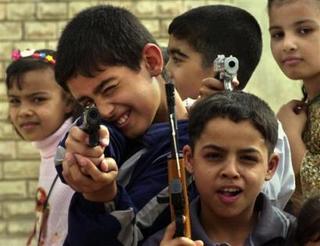
HAMZA HENDAWI Associated Press Writer
Toting menacing looking toy guns, young boys swarm around an abandoned car, chanting battle cries of a Shiite militia and pointing their play weapons at the "terrorist" in the driver's seat. Outnumbered, the boy playing a would-be suicide bomber surrenders. On Baghdad's dusty streets, Iraqi children are playing make-believe war games inspired by the Shiite-Sunni conflict, a development that shows the depth of the city's rapid and violent break-up along sectarian lines (...) In Sadr City, the Baghdad stronghold of the Mahdi Army, the "bad guys" are "Wahabbis," or Sunni religious extremists. Sometimes the game becomes "Sadr City vs Azamiyah," referring to a nearby Sunni neighborhood. In New Baghdad, a mixed area where Shiites are most numerous, kids play "police and terrorists." Some of the children even dress up in black shirts that resemble Mahdi Army attire. Those playing the cops put on black ski masks, often used by Baghdad police to hide their identity...
continua / continued
Blame it all on Bush. That is our mantra right now
 Steve Moyer, Al-Jazeerah
Steve Moyer, Al-JazeerahIf we end up creating a huge conflagration in the Middle East we will "blame it all on Bush." He is the worst President ever in American history. He lied us into an unnecessary war. He created unnecessary conflict. He inflamed the terrorism of the Middle East. Excuse me for breaking the contemporary spell, but "it's all us." Sure, Bush did it. It's all true. He's an evil President. But he's doing our will. We are the evil people who want a scapegoat for our own greed and selfishness. We want to "blame it all on Bush" so we don't have to take responsibility for the reality we create...
continua / continued
Ashes & Dust ...
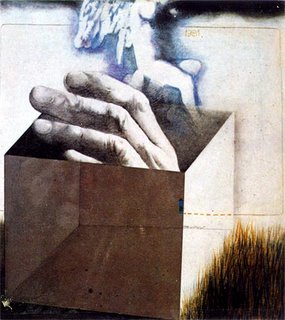 Layla Anwar, An Arab Woman Blues
Layla Anwar, An Arab Woman BluesLet me teach you a few words in Arabic. Ashes is "Ramad" and Dust is "Turab" which also means earth, the soil, and "Turba" may also mean tomb or more exactly the grounds where someone is buried.
Ramad and Turab is what Ramadi looks like today. Ramadi in the Anbar province. The hated Anbar, part of the "triangle". The ever so despised Anbar by both the Americans and the Iranians. The hatred was most evident today.
The American Forces - wait, I take that back - they are not forces, they are cowards. The American cowards bombed Ramadi today.
Many homes were demolished. A family of thirteen was buried under the rubbles. More than 26 civilians were killed, out of which 4 women and several children. Two infants, the youngest was 1 month old.
Men rushed to the ruins trying to rescue whatever human form they can find. Bare hands, rugged, dust covering their faces and hair, digging and digging... Most had nothing but a shirt on. No vest, no sweater, no nothing, just a shirt, in this bitter cold. And I watched their feet, they were wearing plastic slippers in winter, no socks, no shoes...no nothing. I watched even more carefully and most were very thin and looked malnourished...
They finally managed to pull the little infant out from under piles of thick bricks. A dust covered baby with an ashen complexion and her tiny lips ripped apart. A small piece of greyish white cloth was handed and she was wrapped in it in a tiny bundle....
Then the camera zoomed in on the eyes of the onlookers. They all had this one common, identical expression.
A kind of a hollow, lingering gaze like being here and not here.Then the camera zoomed in even closer... and behind the hollowness in the eyes, lied the utter void, an endless void. A tunnel of despair that seemed to stretch to eternity...
A younger man, not older than 16 wept then stared back at the camera and he kept staring and I saw a lingering death about to explode, in his deep black eyes.
Meanwhile in Baghdad, a bunch of kids, not older than 13, scavenge through dumps and piles of garbage.One is orphaned, her mother was shot in Falluja. The girl lost a finger when a metal scrap from the junk yard severed it from her small hand. The other, piles up empty cans to sell for 1 dollar a bag. Another, found 4 pieces of bread, he dusts them and keeps them for breakfast to share with the rest of his family.
.A lost infant in the ashes, lost faces in the dust, a lost finger in the garbage dumps, a lost mother in the debris, a nation lost in the fire, a country lost in the greed ....and eyes lost in that endless tunnel of helplessness, anguish and despair...Lost in the total emptiness, in the void of the living dead.
Where is Gilad Atzmon, I need him to hum something to me, I am choking with endless Grief...
You sleep well now.Painting : Iraqi artist, Mohammed Muhraddin.
continua / continued
The report didn't disprove the woman's allegations
McClatchy Newspapers
BAGHDAD, Iraq - The Iraqi prime minister's office, eager to prove that a Sunni Muslim woman was lying when she accused Iraqi police of raping her, released one page of a U.S. Army medical examination report on Wednesday that Iraqi officials said showed the woman wasn't sexually assaulted.
The single sheet, apparently part of a multi-page report, said that there were "no vaginal lacerations or obvious injury." An accompanying statement asserted that the medical report "confirmed" there had been no rape, but several rape experts in the United States said the report did no such thing.
The report didn't disprove the woman's allegations, the experts said, and it indicated that the woman suffered extensive injuries, including at least eight bruises on the front of her thighs consistent with a sexual assault. >>>cont
Iraqi boys in wrong place at wrong time in Baghdad
By Carlos Barria
BAGHDAD, Feb 23 (Reuters) - "It's a kid, it's a kid, don't shoot," the Iraqi translator shouted to American soldiers as the boy screamed, cowering in a concrete ditch by a river bank in southern Baghdad.
Nearby, the body of another boy lay behind a metal garbage container that had been torn open by a high-calibre round or a blast. Blood stained his hair.
The two boys, and another who was also hiding in the ditch on the eastern side of the Tigris River, looked no older than 12.
LinkHere
Bush ignoring urgent warning about Qaeda 'comeback'
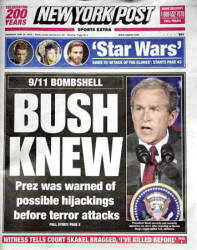 RAW STORYPublished: Saturday February 24, 2007
RAW STORYPublished: Saturday February 24, 2007Comparing the debate on the "surge" or escalation of US troops in Iraq to a "sideshow" like media coverage of pop star Britney Spears' shaving of her head, New York Times columnist Frank Rich worries that, just like in August of 2001, President Bush is ignoring urgent warnings by counterterrorism officials about Osama bin Laden and al Qaeda.
Referring to "last week's terrifying but little-heeded front-page New York Times account (link) of U.S. 'intelligence and counterterrorism officials' leaking urgent warnings about al Qaeda's comeback," Rich writes in his latest Sunday Times column, "ask yourself: Haven't we been here before?"
"If so, that would be the summer of 2001, when America pigged out on a 24/7 buffet of Gary Condit and shark attacks," Rich writes. "The intelligence and counterterrorism officials back then were privately sounding urgent warnings like those in last week's Times, culminating in the President's Daily Brief titled 'Bin Laden Determined to Strike in U.S.' The system 'was blinking red,' as the CIA chief George Tenet would later tell the 9/11 commission. But no one, from the White House on down, wanted to hear it."
Rich believes that Bush "doesn't want to hear it now, either," which is "why terrorism experts are trying to get its attention by going public."
Hacker puts judge in prison
By Nick Farrell: Friday 23 February 2007, 08:05
A HACKER'S investigation of Superior Court Judge Ronald C. Kline's computer has finally resulted him being sentenced to 27 months in federal prison for possession of child pornography.
Klince offered "a lifetime of apologies" and then fainted as he was sent down.
During the six years of court battles, Kline lost his job as a judge and was ordered to wear a tracking anklet and placed on home< href="http://www.ocregister.com/ocregister/homepage/abox/article_1585206.php" target="blank">Orange County Register. µ
"It's another unseen expense of the war,"
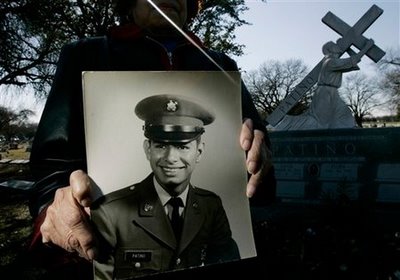
Flora Patino holds a photo of her son, Hector C. Patino, at the family’s cemetery plot in San Antonio, Friday, Feb. 16, 2007. Patino, 58, was driving a truck for a Halliburton subsidiary in the heavily fortified Green Zone in Iraq when he was killed in a friendly-fire incident at an Australian checkpoint. In a largely invisible cost of the war in Iraq, nearly 800 civilians working under contract to the Pentagon have been killed and more than 3,300 hurt doing jobs normally handled by the U.S. military, according to figures gathered by The Associated Press. (AP Photo/Eric Gay)
By Stuart Munckton “We, and millions of people around the world … believe another world is possible, a world free from war, poverty and hunger. Here in Venezuela the [government of socialist President Hugo Chavez] along with the majority of the people in our country are fighting hard to build this new world, despite the attempts of the old elite and the US government to prevent us from succeeding."
Continue
By Stephen LendmanThese are dramatic examples of two nations going opposite ways. In Venezuela, Hugo Chavez supports free expression, social democracy, and using state revenues to insure and improve both. In the US, both parties support wealth and power, are jointly running a criminal enterprise masquerading as legitimately elected government.
Continue
Bush's Iraq War
Though the US war on Iraq has been a disaster for nearly everyone, the Israelis have benefited in three distinct ways:
Israeli rule 'like apartheid'
An independent report commissioned by the United Nations compares Israel's actions in the West Bank and Gaza to apartheid South Africa — charges that drew angry rebukes from Israel and may revive charges that the U.N. Human Rights Council is biased against the Jewish state.
The Final Punch
 As the voice of reason, from a traditionalist viewpoint, is being hushed or sidelined, the warmongers’ hold on Washington is still as tight as ever, one of whom is Israel and its dedicated friends on Capitol Hill.
As the voice of reason, from a traditionalist viewpoint, is being hushed or sidelined, the warmongers’ hold on Washington is still as tight as ever, one of whom is Israel and its dedicated friends on Capitol Hill.By Ramzy BaroudPalestineChronicle.com
The configuration of the New Middle East — as envisaged by US Secretary of State Condoleezza Rice during the Israeli war against Lebanon in July-August 2006, most certainly has no place for more than one regional power broker, namely Israel.
Under such an arrangement — subservient Arabs and Iran governed by an all powerful Israel and supervised, even from afar by the seemingly philanthropic United States — would ensure Israel’s ‘security’, which has for long served as a casus belli, and supposed American interests in the region; regardless of what one thinks of such logic, in Washington, it is still prevailing.
With the elimination of Iraq — not just Saddam Hussein and his Baath Party as some in the mainstream media tirelessly reiterate, but rather Iraq as a strong Arab nation with immense regional influence — the long sought pact is close at hand. Iran, however, remains the only menacing reality that stands between Israel and its powerful Washingtonian allies and this New Middle East.
This means that the war of words between Teheran and Washington is mostly inspired by this redoubtable strategic chasm: where Washington strives to knock the Iran factor out of the regional equation, and Teheran pushes with all of its might to keep itself pertinent, indeed equally relevant to the shaping of the region’s future. >>>cont
LinkHere
A Trial for Thousands Denied Trial

By Naomi Klein
02/23/07 "The Nation" -- [from the March 12, 2007 issue] -- Something remarkable is going on in a Miami courtroom. The cruel methods US interrogators have used since September 11 to "break" prisoners are finally being put on trial.
This was not supposed to happen. The Bush Administration's plan was to put José Padilla on trial for allegedly being part of a network linked to international terrorists. But Padilla's lawyers are arguing that he is not fit to stand trial because he has been driven insane by the government.
Arrested in May 2002 at Chicago's O'Hare airport, Padilla, a Brooklyn-born former gang member, was classified as an "enemy combatant" and taken to a Navy prison in Charleston, South Carolina. He was kept in a 9-by-7-foot cell with no natural light, no clock and no calendar. Whenever Padilla left the cell, he was shackled and suited in heavy goggles and headphones. Padilla was kept under these conditions for 1,307 days. He was forbidden contact with anyone but his interrogators, who punctured the extreme sensory deprivation with sensory overload, blasting him with harsh lights and pounding sounds. Padilla also says he was injected with a "truth serum," a substance his lawyers believe was LSD or PCP.
According to his lawyers and two mental health specialists who examined him, Padilla has been so shattered that he lacks the ability to assist in his own defense. He is convinced that his lawyers are "part of a continuing interrogation program" and sees his captors as protectors. In order to prove that "the extended torture visited upon Mr. Padilla has left him damaged," his lawyers want to tell the court what happened during those years in the Navy brig. The prosecution strenuously objects, maintaining that "Padilla is competent," that his treatment is irrelevant.
US District Judge Marcia Cooke disagrees. "It's not like Mr. Padilla was living in a box. He was at a place. Things happened to him at that place." The judge has ordered several prison employees to testify at the hearings on Padilla's mental state, which begin February 22. They will be asked how a man alleged to have engaged in elaborate antigovernment plots now acts, in the words of brig staff, "like a piece of furniture."
It's difficult to overstate the significance of these hearings. The techniques used to break Padilla have been standard operating procedure at Guantánamo Bay since the first prisoners arrived five years ago. They wore blackout goggles and sound-blocking headphones and were placed in extended isolation, interrupted by strobe lights and heavy metal music. These same practices have been documented in dozens of cases of CIA "extraordinary rendition" as well as in prisons in Iraq and Afghanistan.
Many have suffered the same symptoms as Padilla. According to James Yee, former Army Muslim chaplain at Guantánamo, there is an entire section of the prison called Delta Block for detainees who have been reduced to a delusional state. "They would respond to me in a childlike voice, talking complete nonsense. Many of them would loudly sing childish songs, repeating the song over and over." All of Delta Block was on twenty-four-hour suicide watch.
Human Rights Watch has exposed a US-run detention facility near Kabul known as the "prison of darkness"--tiny pitch-black cells, strange blaring sounds. "Plenty lost their minds," one former inmate recalled. "I could hear people knocking their heads against the walls and the doors."
These standard mind-breaking techniques have never faced scrutiny in a US court because the prisoners in the jails are foreigners and have been stripped of the right of habeas corpus--a denial that, scandalously, was just upheld by a federal appeals court in Washington, DC. There is only one reason Padilla's case is different: He is a US citizen. The Administration did not originally intend to bring Padilla to trial, but when his status as an enemy combatant faced a Supreme Court challenge, the Administration abruptly changed course, charging Padilla and transferring him to civilian custody. That makes Padilla's case unique: He is the only victim of the post-9/11 legal netherworld to face an ordinary US trial.
Now that Padilla's mental state is the central issue in the case, the government prosecutors have a problem. The CIA and the military have known since the early 1960s that extreme sensory deprivation and sensory overload cause personality disintegration--that's the whole point. "The deprivation of stimuli induces regression by depriving the subject's mind of contact with an outer world and thus forcing it in upon itself. At the same time, the calculated provision of stimuli during interrogation tends to make the regressed subject view the interrogator as a father-figure." That comes from Kubark Counterintelligence Interrogation, a 1963 declassified CIA manual for interrogating "resistant sources."
The manual was based on the findings of the agency's notorious MK Ultra program, which in the 1950s funneled about $25 million to scientists to research "unusual techniques of interrogation." One of the psychiatrists who received CIA funding was the infamous Ewen Cameron of Montreal's McGill University. Cameron subjected hundreds of psychiatric patients to large doses of electroshock and total sensory isolation and drugged them with LSD and PCP. In 1960 Cameron gave a lecture at the Brooks Airforce Base in Texas in which he stated that sensory deprivation "produces the primary symptoms of schizophrenia."
There is no need to go so far back to prove that the US military knew full well that it was driving Padilla mad. The Army's field manual, reissued just last year, states, "Sensory deprivation may result in extreme anxiety, hallucinations, bizarre thoughts, depression, and anti-social behavior," as well as "significant psychological distress."
If these techniques drove Padilla insane, that means the US government has been deliberately driving hundreds, possibly thousands, of prisoners insane around the world. What is on trial in Florida is not one man's mental state. It is the whole system of US psychological torture.
Iraq's Civilian Death Toll "Woefully" Underestimated
 Associated Press February 24, 2007 08:46 AM
Associated Press February 24, 2007 08:46 AMIraqi civilian deaths are estimated at more than 54,000 and could be much higher; some unofficial estimates range into the hundreds of thousands. The U.N. Assistance Mission for Iraq reports more than 34,000 deaths in 2006 alone.
Among those polled for the AP survey, however, the median estimate of Iraqi deaths was 9,890. The median is the point at which half the estimates were higher and half lower.
READ FULL STORY
GUANTANAMO Bay detainee David Hicks faces years of litigation before he has any chance of being free,
 Hicks will 'be in court for years'
Hicks will 'be in court for years'Japan completes set of spy satellites
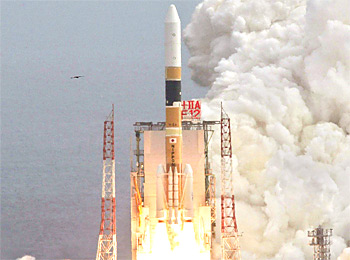 4, 3, 2, 1 ... Japan today launched the last in a set of four spy satellites produced after a provocation from North Korea, which will allow the Government to monitor any point on Earth once a day
4, 3, 2, 1 ... Japan today launched the last in a set of four spy satellites produced after a provocation from North Korea, which will allow the Government to monitor any point on Earth once a day/ AFP More
US Forbids Israel-Syria Talks
U.S. hardens line on talks between Jerusalem, Damascus
The United States demanded that Israel desist from even exploratory contacts with Syria, of the sort that would test whether Damascus is serious in its declared intentions to hold peace talks with Israel.
It is also known that Syria, like Iran, continues to provide Hezbollah with arms and equipment.
Another U.S. Military Assault on Media
Iraqi journalists are outraged over yet another U.S. military raid on the media. U.S. soldiers raided and ransacked the offices of the Iraq Syndicate of Journalists (ISJ) in central Baghdad Tuesday this week. Ten armed guards were arrested, and 10 computers and 15 small electricity generators kept for donation to families of killed journalists were seized. This is not the first time U.S. troops have attacked the media in Iraq, but this time the raid was against the very symbol of it. Many Iraqis believe the U.S. soldiers did all they could to deliver the message of their leadership to Iraqi journalists to keep their mouth shut about anything going wrong with the U.S.-led occupation...
continua / continued
ENCAMPMENT TO STOP THE WAR BEGINNING MARCH 12 IN WASHINGTON DC

Message to Congress:
Beginning March 12 in Washington DC (Before the March on the Pentagon on Saturday - March 17. STAY IN WASHINGTON DC FOR THE ENCAMPMENT TO END THE WAR WHERE? on the mall directly in front of the Capitol building (3rd street between Constitution and Independence) WHY NOW? During the week beginning March 12, Congress will begin voting on Bush’s request for $100 billion more for the wars in Iraq and Afganistan. If Congress votes to cut off funds, they can end the war now and bring the troops home. If they approve Bush’s war funds, the killing, and dying and occupation will go on…it’s as simple as that. This vote will be the most important war related vote since Congress voted to authorized Bush to invade and occupy Iraq in October of 2002. The antiwar movement must be there to let Congress know that we won’t let them get away with it this time...
continua / continued
Taliban 'in control' in Helmand
 James Bays, Aljazeera.net
James Bays, Aljazeera.netAl Jazeera has uncovered evidence that Taliban fighters are now in effective control of large parts of a key province in southwest Afghanistan, despite recent claims by Nato that their bases had been destroyed. James Bays spent two days with the Taliban in Helmand and found that the group is running schools and medical facilities, and is travelling armed and unchallenged by Nato-led forces. Here is his report...
continua / continued
Scramble for Iraq's oil begins as troops start to pull out
We are about to find out if the invasion of Iraq really was a war for oil. The country is on the verge of passing a petroleum law, which will set down rules for investing in its oil industry. That will set off a race among the foreign oil giants, scrambling for their slice of Iraq's vast oil riches. Britain's two world-leading oil companies, BP and Shell, both say they want to enter Iraq. Exxon, ConocoPhillips, Total, Russia's Lukoil and the Chinese will also form part of the rush..
continua / continued
Walter Reed: Is The Worst Yet to Come?
Walter Reed is just the tip of the iceberg. When these same veterans leave and return to their local clinics and hospitals, they will be entering the chronically underfunded and understaffed VA system.
READ POST
Canada's top court strikes down anti-terror measures
Canada's high court on Friday quashed extraordinary security detentions of foreigners suspected of terror ties without charges for many years, saying they breach civil rights.
Lawyers for three men with alleged terror links asked the Supreme Court of Canada in June 2006 to review the so-called security certificates. They were backed by 11 civil rights groups.
The nine justices said in their decision: "The procedure, under (sections) of the Immigration and Refugee Protection Act, is inconsistent with the Canadian Charter of Rights and Freedoms and hence of no force or effect."
However, the law will remain in effect for one year to allow Parliament to amend it. >>>cont
LinkHere
Alleged intel fixer Chalabi to assume new role as part of 'surge'
 Brian BeutlerPublished: Friday February 23, 2007
Brian BeutlerPublished: Friday February 23, 2007Ahmed Chalabi, the former deputy prime minister of Iraq who has come under suspicion for his pre-war involvement in supplying questionable intelligence supporting the invasion, has assumed a new role within the Iraqi government, according to a report in today’s Wall Street Journal.
According to the Journal, “Mr. Chalabi will serve as an intermediary between Baghdad residents and the Iraqi and U.S. security forces mounting an aggressive counterinsurgency campaign across the city. The position is meant to help Iraqis arrange reimbursement for damage to their cars and homes caused by the security sweeps in the hope of maintaining public support for the strategy.”
In his new position, Chalabi will be responsible for security tasks. The Journal reports, “Mr. Chalabi's writ is supposed to be limited mainly to security, according to aides to Iraqi Prime Minister Nouri al-Maliki, but he is already speaking ambitiously about playing a larger role in economic, health and reconstruction efforts as well. In his new capacity, Mr. Chalabi answers directly to Mr. Maliki and is already taking part in weekly planning meetings with senior American officials such as Ambassador Zalmay Khalilzad and Gen. David Petraeus, the top U.S. military commander in Iraq.”
Chalabi, who "was convicted and sentenced in absentia for bank fraud by a Jordanian military court" (CNN) back in 1992, has had a rocky history with both the American and Iraqi governments, in large part because of his role in the buildup to the war.
As head of the Iraqi National Congress (INC) Chalabi became central to the neoconservative push for regime change in Iraq as early as 1997, and is alleged to have begun fabricating evidence for weapons inspectors around the same time. In 2001, the INC set up a program to transmit stories from Iraqi exiles directly to the Pentagon's Office of Special Plans, with the intention of doing an end run around the CIA. These stories, many of which are alleged to have been fabricated, were propagated by prominent journalists including most notably Judith Miller at the New York Times.
Although neither the CIA nor the State Department trusted Chalabi, he remained popular with the neoconservatives in the Pentagon and in Vice President Cheney's office as the Bush administration moved towards an invasion of Iraq. Chalabi was instrumental in transmitting the claims of an Iraqi defector codenamed “Curveball” about mobile biological weapons laboratories that the administration used as part of its war rationale.
Despite his background, Chalabi has continued to play varying roles in the government of Iraq since the invasion. He was named by the US to the interim Iraqi governing council in 2003, becoming the council’s president that September, but his unpopularity within Iraq frustrated any higher political ambitions he might have had. In 2004, Chalabi came under suspicion for currency fraud and of transmitting US state secrets to Iran, but he was never arrested. He served as deputy prime minister and acting oil minister in 2005.
Chalabi has been critical of President Bush for his mishandling of the war. However, before the November elections brought Democrats into control of Congress, Congressional Quarterly reported that then-vice chairman of the Senate Select Committee on Intelligence John Rockefeller (D-WV) had said that “Republicans protected Bush by preventing the investigation into Chalabi's group from going anywhere near the White House.”
(additional research by RAW STORY Research Director Muriel Kane)
LinkHere
Friday, February 23, 2007
White House: Do Not Take Away Bush 'Decider' Status
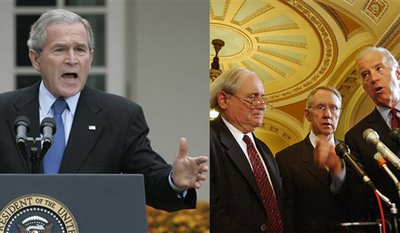 AP DAVID ESPO February 23, 2007 02:18 PM
AP DAVID ESPO February 23, 2007 02:18 PMThe White House said Friday it would oppose any attempt by Senate Democrats to revoke the 2002 congressional resolution authorizing the war in Iraq and leave U.S. troops with a limited mission as they prepare to withdraw.
The Bush administration argued that changes in the resolution were unnecessary even though it was drafted in the days when Saddam Hussein was in power and there was an assumption -- later proved false -- that Iraq possessed weapons of mass destruction. Still, the White House said that Democrats were in a state of confusion about Iraq.
READ FULL STORY
Obama: ‘When Cheney Says It's Good…You've Got Big Problems’

Associated Press February 23, 2007 06:18 PM
"Now if Tony Blair can understand that, than why can't George Bush and Dick Cheney understand that?" Obama asked thousands of supporters who gathered in the rain to hear him. "In fact, Dick Cheney said this is all part of the plan (and) it was a good thing that Tony Blair was withdrawing, even as the administration is preparing to put 20,000 more of our young men and women in.
"Now, keep in mind, this is the same guy that said we'd be greeted as liberators, the same guy that said that we're in the last throes. I'm sure he forecast sun today," Obama said to laughter from supporters holding campaign signs over the heads to keep dry. "When Dick Cheney says it's a good thing, you know that you've probably got some big problems."
READ FULL STORY
Taliban: We Are Back For "Bloodiest" Year
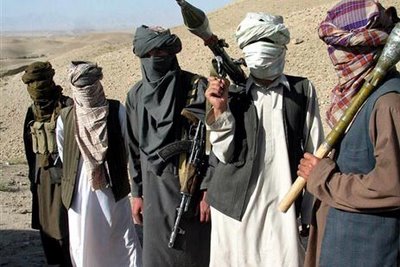 Reuters February 23, 2007 11:20 PM
Reuters February 23, 2007 11:20 PMArmed with new guns the Taliban on Friday vowed this would be the deadliest year for foreign soldiers in Afghanistan since the Islamists were toppled in 2001.
"This year will prove to be the bloodiest for the foreign troops. It is not just a threat, we will prove it," senior commander Mullah Dadullah told Reuters by satellite phone.
READ FULL STORY
Routine Practices of Torture by US Forces in Iraq: Testimony of Abbas Z. Abid to the Kuala Lumpur War Crimes Commission
 Gloabalresearch.ca
Gloabalresearch.caI, Abbas Z. Abid (Iraqi Passport No: S379532) of full age and an Iraqi citizen do hereby solemnly and sincerely declare as follows: 1. I am 43 years old. 2. I live in Fallujah, a city in Iraq. 3. I am an Electrical Engineer. Prior to my arrest and detention, I was the Chief Engineer in the Science and Technology Ministry in Baghdad. 4. The purpose of making this statutory declaration is to put on record my torture experience when I was detained in the "Al-Jadiria" prison (...) My torture consisted of the following: a. Hitting with various tools (thick cudgels, cables, metal pipes, metal ribbons); b. Electric shocks in various parts of the body and especially the penis; c. Forcing me to drink allot of water mixed with a diuretic solution, and my penis then tied with a rubber band to prevent me from urinating; d. Hanging me from the wall while hanging weights from my penis for long hours; e. Threaten to sexually assault me; f. Play with my sexual organs; g. Frightening me by shooting a gun around, near and above my head; h. Threaten to sexually abuse my wife and my mother after bringing them to the prison; i. Cut off all food or drinks (except the water I was forced to drink with the diuretic solution) during the investigation period; j. Forcefully extracting my finger nails; k. Hanging me from the wall for long hours until I fainted - the hanging method is by handcuffing my hands to the back and then hang me up from the handcuffed hands so that my shoulder get dislocated...
continua / continued
Urgent: destroying Baghdad’s victory-arch
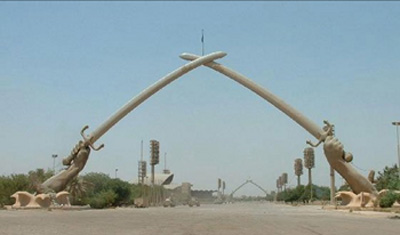 Roads to Iraq
Roads to IraqInformation came right now from Baghdad not confirmed yet that the process of dismantling the swords and the arms of Victory-Arch in Basghdad celebration arena started today. The monument is one of the distinguish landmarks of Baghdad represents the Iraqi victory against Iran. The whole monument from top to bottom was made from Iranians military hardware leftovers in the 1980-1988 war. The monument also is the main entrance to the Iraq’s cultural-park contains cinemas, theaters and art galleries...
continua / continued
"They Promised Us Freedom and Now We Find Ourselves the Slaves"
...Mr Cordesman says that while the British won some tactical clashes in Basra and Maysan province in 2004, that "did not stop Islamists from taking more local political power and controlling security at the neighborhood level when British troops were not present". As a result, southern Iraq has, in effect, long been under the control of the Supreme Council for Islamic Revolution in Iraq (SCIRI) and the so-called "Sadrist" factions. Mr Blair said for three years Britain had worked to create, train and equip Iraqi Security Forces capable of taking on the security of the country themselves. But Mr Cordesman concludes: "The Iraqi forces that Britain helped create in the area were little more than an extension of Shia Islamist control by other means."...
continua / continued
Afghans can now "begin to realize [their] dreams."
by Chris Sands
A crazy woman stalks the streets near Afghanistan’s parliament. When a warlord’s rocket killed her family during the early 1990s she lost her mind. Now she moves between the cars and people looking for it, another of the living dead trapped in her own private hell.
She’s always around there somewhere: in front of the homes still wrecked after they were destroyed more than a decade ago, next to the police station that was torched by a mob last year, in the gutter as an MP cruises by in his SUV.
That’s how life is here. Every corner has its own pitiful story and the old sorrow mixes with the new until it all becomes part of the same incessant sadness.
In December a man was shot in the center of Kabul, not far from the presidential palace. His attackers stole the $25,000 they knew he would be carrying and left his corpse to freeze in the evening air. A week earlier an infant spilt boiling water over himself at home. He was buried in a simple ceremony soon afterwards.
Peace is only relative in a country where if the bombs and bullets don't get you, something else will. The winter brings death from poverty and desperation, spring adds intense violence to the mix. >>>cont
Contrary to its rhetoric and its international legal obligations, the Bush Administration has refused to protect women's rights in Iraq.
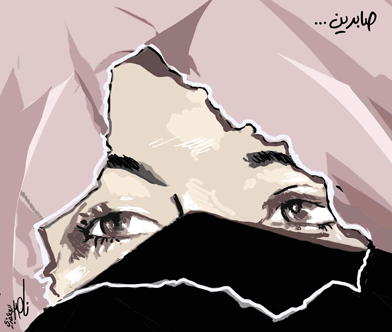
NUMBER 9
A US helicopter lands on a clearing near Fallujah railway station, Nov. 9. (Xinhua/Reuters Photo)Photo Gallery>>> BAGHDAD, Feb. 22 (Xinhua) -- A U.S. helicopter crashed in an area north of Baquba City, 65 km northeast of Baghdad, on Thursday, the Qatar-based al-Jazeera satellite TV channel reported.
The helicopter went down in a clash between gunmen and U.S. troops, the report quoted witnesses as saying, without specifying location of the crash.
If confirmed, it would be the ninth U.S. helicopter crashed or shot down by insurgents' fire since Jan. 20, which has killed 28 soldiers and civilians so far.
The incident came one day after the U.S. military announced a Black Hawk helicopter was shot down by insurgent fire in the Nibaie area near the U.S. airbase of Taji, some 20 km north of Baghdad.
U.S. military spokesman Major General William Caldwell said that the initial indications appear that the helicopter was brought down by small-arms fire and rocket-propelled grenades.
An Iraqi Islamic militant group called Jaish al-Mujahideen claimed responsibility for the crash in a website statement whose authenticity could not be verified.
Editor: Han Lin
Iraqis Eke Out Living in Baghdad Rubbish Dump
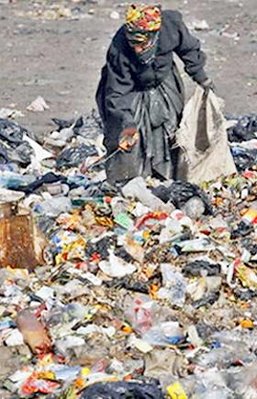
BAGHDAD, Feb 22 (Reuters) - Sitting amid mounds of rotting garbage in a rubbish dump in Baghdad, 13-year-old Huda Hamdan is the human face of a new U.N. report that says a third of war- torn Iraq's 26 million people live in poverty.
The teenager, wearing a black veil, is taking a break from scavenging for aluminium cans and glass bottles that she sells for a few Iraqi dinars. She tries not to gag from the stench of the decomposing household refuse surrounding her.
She and her six brothers and sisters compete with scores of other diggers, many children and women, made homeless by sectarian violence that has forced them to flee their homes and seek refuge in the sprawling Shi'ite slum of Sadr City.
Scores of displaced Shi'ite families have made the rubbish dump their home -- living in unsanitary conditions in tents, crude shacks made from oil cans or squatting in an empty building -- and trying to eke out the barest of livings. >>>cont
U.S. forces detain son of powerful Iraqi politician
KUT, Iraq (Reuters) - U.S. troops detained the eldest son of Iraq's powerful Shi'ite politician Abdul Aziz Hakim at a border checkpoint with Iran on Friday, Iraqi security force officials told Reuters.
The U.S. military said it was checking the report.
Ammar Hakim's convoy was stopped at the Badrah checkpoint in Wasit province as he returned from Iran, they said. It was not immediately clear why he had been detained. The Iraqi security sources said U.S. forces had taken him to forward operating base Delta, a U.S. camp in nearby Kut, capital of Wasit province.
A colonel in the Iraqi border guards based in Kut said he was arrested by U.S. troops at gunpoint and handcuffed before being taken away. A colonel in the 8th Division of the Iraqi Army confirmed his arrest.
An aide to a senior SCIRI official sought to play down what had happened, saying: "There was a misunderstanding at an American checkpoint, but now it is over. He was not arrested."
LinkHere
Shiites say U.S. arrested leader's son
Al-Sagheer said the younger al-Hakim's security guards were also detained.
A U.S. spokesman, Lt. Col. Christopher Garver, said he was looking into the report and "we will release information as it becomes available."
LinkHere
The U.S. focus on al-Sadr overlooks the fact that Iran has even deeper, stronger links to the very Shiite and Kurdish parties the Americans consider their partners in Iraq.
Those include the Shiite group Supreme Council for the Islamic Republic in Iraq, whose leader Abdul-Aziz al-Hakim has been welcomed in both Washington and Tehran, and the Dawa party of the prime minister. Both major Kurdish parties also have their own longtime ties to Iran.
In December, U.S. troops detained two Iranian security officials in the home of a Shiite politician associated with al-Hakim. Last month, six other Iranians were captured at an Iranian liaison office in Irbil, the capital of the Kurdish self-ruled region. "It is remarkable that even as the U.S. military seems to spend a lot of energy trying to dig up detailed evidence" against al-Sadr, Washington is courting "the very Iraqi Shiite faction that historically has enjoyed the strongest ties to Iran," Visser said.
LinkHere
No disrespect meant over Iraq arrest -U.S. envoy
U.S. soldiers detained Ammar Hakim at a border checkpoint with Iran on Friday for several hours, before he was freed.
"We don't know the circumstances of his arrest, we are investigating. We do not mean any disrespect to Abdul-Aziz al- Hakim or his family. But he (Ammar) is being released," U.S. ambassador Zalmay Khalilzad told reporters in Baghdad
LinkHere
By KIM GAMEL, Associated Press Writer
BAGHDAD, Iraq - U.S. troops detained the son of Iraq's most powerful Shiite
politician Friday as he returned to the country from Iran, keeping him in
custody for nearly 12 hours before releasing him, Shiite officials said.
The U.S. ambassador apologized for the arrest.
Amar al-Hakim, son of Abdul-Aziz al-Hakim, was taken into custody at a
crossing point and was transferred to a U.S. facility in Kut, according to
the elder al-Hakim's secretary, Jamal al-Sagheer.
U.S. Ambassador Zalmay Khalilzad said the arrest was being investigated
but stressed that Washington did not mean any disrespect to al-Hakim or
his family.
"I am sorry about the arrest," he said. "We don't know the circumstances
of the arrest and we are investigating ... but he is being released."
LinkHere
Fears grow over Iran (British that U.S. Will Strike Iran)
The International Atomic Energy Agency concluded that Iran had expanded its nuclear programme, defying UN demands for it to be suspended. Hundreds of uranium-spinning centrifuges in an underground hall are expected to be increased to thousands by May when Iran moves to “industrial-scale production”. Senior British government sources have told The Times that they fear President Bush will seek to “settle the Iranian question through military means” next year, before the end of his second term if he concludes that diplomacy has failed. “He will not want to leave it unresolved for his successor,” said one.
But there are deep fissures within the US Administration. Robert Gates, the Defence Secretary, who has previously called for direct talks with Tehran, is said to be totally opposed to military action.
Although he has dispatched a second US aircraft carrier to the Gulf, he is understood to believe that airstrikes would inflame Iranian public opinion and hamper American efforts in Iraq and Afghanistan. One senior adviser to Mr Gates has even stated privately that military action could lead to Congress impeaching Mr Bush.
Condoleeza Rice, the Secretary of State, is also opposed to using force, while Steve Hadley, the President’s National Security Adviser, is said to be deeply sceptical.
LinkHere
Children confirmed killed
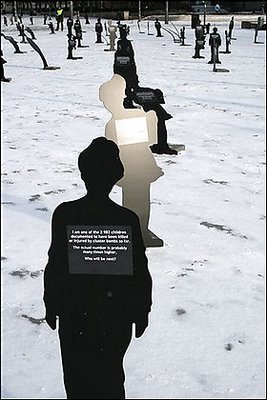
Silhouettes representing the 2,982 children confirmed killed by by cluster bombs that exploded long after wars in their countries ended, crowd a snowy square outside the Nobel Peace Center in Oslo, Norway, Wednesday, Feb. 21, 2007. A 48-nation meeting called by Norway in a drive to ban cluster bombs opens in Oslo on Thursday, despite being snubbed by the United States, Russia and China. Norway hopes to initiate a worldwide drive against cluster bombs similar to the one banning anti-personnel mines, negotiated in Oslo in 1997. (AP Photo/Doug Mellgren) (Doug Mellgren - AP)
(UK Guardian) US Iran intelligence 'is incorrect'
Much of the intelligence on Iran's nuclear facilities provided to UN inspectors by US spy agencies has turned out to be unfounded, diplomatic sources in Vienna said today.
The claims, reminiscent of the intelligence fiasco surrounding the Iraq war, coincided with a sharp increase in international tension as the International Atomic Energy Agency (IAEA) reported that Iran was defying a UN security council ultimatum to freeze its nuclear programme.
...
However, most of the tip-offs about supposed secret weapons sites provided by the CIA and other US intelligence agencies have led to dead ends when investigated by IAEA inspectors, according to informed sources in Vienna.
"Most of it has turned out to be incorrect," a diplomat at the IAEA with detailed knowledge of the agency's investigations said.
"They gave us a paper with a list of sites. (The inspectors) did some follow-up, they went to some military sites, but there was no sign of (banned nuclear) activities.
LinkHere
The gathering was snubbed by some key arms makers _ including the U.S., Russia,
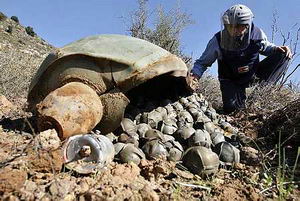
By DOUG MELLGREN
The Associated Press
Friday, February 23, 2007; 7:34 AM
OSLO, Norway -- A declaration calling for a 2008 treaty banning cluster bombs
was adopted Friday by 46 out of 49 nations attending a conference in Oslo,
officials for the Norwegian government and two non-governmental groups said.
Norway's deputy foreign minister Raymond Johansen said Poland, Romania and Japan
did not approve the final declaration. Officials for Human Rights Watch and the
Cluster Munition Coalition also said those three countries dissented.
The gathering was snubbed by some key arms makers _ including the U.S., Russia,
Israel and China _ but organizers said other nations needed to forge ahead
regardless to avoid a potential humanitarian disaster posed by unexploded cluster
munitions.
-snip-
The treaty would "prohibit the use, production, transfer and stockpiling of those
cluster munitions that cause unacceptable harm to civilians," the declaration said.
Cluster Munition Coalition - Wikipedia, the free encyclopedia
Organisations and individuals that make up the CMC witness the effects of cluster munitions first hand through the course ... [edit] See also. Cluster bomb ...
According to the "Jane's Air-Launched Weapons" directory, the U.S.-made CBU-87 "combined effects munition" is a "free-fall cluster bomb" composed of 202 ...
Cluster Bombs: War Crimes of the Bush Administration, Paul ...
But whatever we think about Rumsfeld's humanitarian missiles, he cannot plead ignorance about the traits and effects of cluster bombs. ...
Despite US denials, cluster bombs continue to claim lives in Iraq
The US military is fully aware of the effects of cluster bombs on civilians. In the war against Yugoslavia in 1998, six percent of all the bombs dropped ...
Lieberman Says War Vote Could Prompt Party Switch

Good Afternoon, Ladies And Germs...
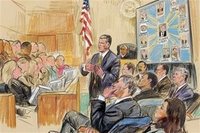 Hope you're right, and we see a conviction.
Hope you're right, and we see a conviction.Fitz.
"This is probably as good a place as any to note that, of the three big attorneys in the case - Fitzgerald, Wells and Jeffress - Fiztgerald was the funniest, at least in front of the jury. I don't mean that I found him to be funniest, though in fact I did. I mean the jury got the most laughs from him, with his snarky asides and notes of incredulous irony. I'm simply making a courtroom observation here, and as a presenter myself, I know how important humor is when attempting to speak persuasively in front of an audience. Thought I should mention it."
"The verdicts will be the final arbiter of this trial's winners and losers, but based purely on being there, feeling it, soaking it all in and watching everyone around me, including close inspection of the defense team, the day of closing arguments belonged to one man, and one man alone.You know the name."<more>
After this gig ends I will be performing all next month with Conrad Black in Chicago.
Labels: Conrad Black
posted by Patrick J. Fitzgerald at 2/22/2007
Paging Sam Donaldson...
White House press corps and ABC News need you.
Cheney's Obsession?
Libby Trial Offered Rare Glimpse of Power, Raised Q's About Vice President's Role
'The Match That Could Start a Runaway Fire'
On August 2nd, 2006, during what would be the last White House Press conference in the briefing room before it underwent major renovations, Sam Donaldson shouted, "Mr. President, should Mel Gibson be forgiven?" – referencing reports of the actor/producer's alleged anti-Semitic remarks. Mr. Bush laughed and looked up to see who had asked the question. Bush joked, "Is that Sam Donaldson? Forget it...you're a has been! We don't have to answer has beens' questions." To which the famously outspoken and aggressive reporter retorted:
"Better to have been a has-been than a never was Mr. President!"
posted by Patrick J. Fitzgerald at 2/23/2007
The long-term wounds of Walter Reed

Feb. 23, 2007 WASHINGTON -- The Pentagon has scrambled this week to contain media coverage of scandalous conditions for war veterans who are outpatients at the acclaimed Walter Reed Army Medical Center in Washington. The lack of services and care, raised by articles in the Washington Post in recent days, were first exposed and brought to the attention of military officials by Salon in a series of investigative reports beginning more than two years ago. Nonetheless, with a spotlight on the problems again now, top officials are claiming they did not know about them. They are also seeking to convey the message that the problems are relatively inconsequential and will be easily fixed.
In a press conference on Wednesday, the highest civilian official in charge of the military medical program, Assistant Secretary of Defense for Health Affairs Dr. William Winkenwerder Jr., said of the failures at Walter Reed: "This news caught me -- as it did many other people -- completely by surprise." At the same time, top brass tried to keep the focus on moldy walls, mouse droppings and other squalid but easily fixed conditions reported on by the Post from Building 18, a 54-room facility just off campus from the main hospital grounds across Georgia Avenue. "We were absolutely disappointed in the status of the rooms and found delays and lack of attention to detail to the building's repairs inexcusable," Gen. Richard Cody, the Army vice chief of staff, said at the press conference.
Winkenwerder referred to the issues raised as "quality-of-life experience" problems for outpatients at Walter Reed and denied there was a systemic problem with military health care. "That is not the issue," he stated.
It was a maneuver with little promise of standing up to scrutiny. What the renewed coverage again dragged out into the open, now four years into the Iraq war, is an ongoing failure to treat a growing number of outpatients in an already overwhelmed military healthcare system. It also points to the issue of compensating veterans for their wounds over the long term, which veterans advocates say has proved to be a complicated, time-consuming process that has pit many injured soldiers against the military in a fight for dollars.
And these problems extend far beyond Walter Reed hospital. Similar disgraces have played out for outpatients recovering at Fort Stewart, Ga., and Fort Carson, Colo., according to other media reports. Steve Robinson, director of Veterans Affairs at Veterans for America, has been visiting soldiers at Walter Reed and at other installations across the country since the beginning of the war. He calls the situation a national failure. >>>cont
COLATORAL DAMAGE
18 th Feb 2005 it was out there, it was posted at Rebelle, and it will be off the front pages in a week or 2, you can be assured The GOP cares for its military
Expose on Very Serious Problems at Walter Reed: Behind the Walls of Ward 54

Article Title: Expose on Very Serious Problems at Walter Reed: Behind the Walls of Ward 54
http://www.veteransforcommonsense.org/?Page=Article&ID=2852
The facts surrounding the case of Army Master Sgt. James Curtis Coons are very shocking. The full story shown below describes how poorly our Nation's wounded, injured, and ill are treated at Walter Reed Army Medical Center. The bottom line is that WRAMC medical care represents a national disgrace at any time, and it is far worse during wartime.
Behind the walls of Ward 54
They're overmedicated, forced to talk about their mothers instead of Iraq, and have to fight for disability pay. Traumatized combat vets say the Army is failing them, and after a year following more than a dozen soldiers at Walter Reed Hospital, and reporter Mark Benjamin says he believes the soldiers.
Feb. 18, 2005 WASHINGTON -- Before he hanged himself with his bathrobe sash in the psychiatric ward at Walter Reed Army Medical Center, Spc. Alexis Soto-Ramirez complained to friends about his medical treatment. Soto-Ramirez, 43, had been flown out of Iraq five months before then because of chronic back pain that became excruciating during the war. But doctors were really worried about his mind. They thought he suffered from post-traumatic stress disorder after serving with the 544th Military Police Company, a unit of the Puerto Rico National Guard, the kind of unit that saw dirty, face-to-face combat in Iraq.
A copy of Soto-Ramirez's medical records, reviewed by Salon, show that a doctor who treated him in Puerto Rico upon his return from Iraq believed his mental problems were probably caused by the war and that his future was in the Army's hands. "Clearly, the psychiatric symptoms are combat related," a clinical psychologist at Roosevelt Roads Naval Hospital wrote on Nov. 24, 2003. The entry says, "Outcome will depend on adequacy and appropriateness of treatment." Doctors in Puerto Rico sent Soto-Ramirez to Walter Reed in Washington, D.C., to get the best care the Army had to offer. There, he was put in Ward 54, Walter Reed's "lockdown," or inpatient psychiatric ward, where the most troubled patients are supposed to have constant supervision.
But less than a month after leaving Puerto Rico, on Jan. 12, 2004, Soto-Ramirez was found dead, hanging in Ward 54. Army buddies who visited him in the days before his death said Soto-Ramirez was increasingly angry and despondent. "He was real upset with the treatment he was getting," said René Negron, a former Walter Reed psychiatric patient and a friend of Soto-Ramirez's. "He said: 'These people are giving me the runaround ... These people think I'm crazy, and I'm not crazy, Negron. I'm getting more crazy being up here.'
"Those people in Ward 54 were responsible for him. Their responsibility was to have a 24-hour watch on him," Negron said in a telephone interview from his home in Puerto Rico. While Soto-Ramirez's death was by his own hand, Negron and other soldiers say the hospital shares the blame.
In fact, repeated interviews over the course of one year with 14 soldiers who have been treated in Walter Reed's inpatient and outpatient psychiatric wards, and a review of medical records and Army documents, suggest that the Army's top hospital is failing to properly care for many soldiers traumatized by the Iraq war. As the Soto-Ramirez case suggests, inadequate suicide watch is one concern. But the problems run deeper. Psychiatric techniques employed at Walter Reed appear outmoded and ineffective compared with state-of-the-art care as described by civilian doctors. For example, Walter Reed favors group therapy over one-on-one counseling; and the group therapy is mostly administered by a rotating cast of medical students and residents, not full-fledged doctors or veterans. The troops also complain that the Army relies too much on pills; few of the soldiers took all the medication given to them by the hospital.
Perhaps most troubling, the Army seems bent on denying that the stress of war has caused the soldiers' mental trauma in the first place. (There is an economic reason for doing so: Mental problems from combat stress can require the Army to pay disability for years.) Soto-Ramirez's medical records reveal the economical mindset of an Army doctor who evaluated him.
"Adequate care and treatment may prevent a claim against the government for PTSD," wrote a psychologist in Puerto Rico before sending him to Walter Reed.
"The Army does not want to get into the mental-health game in a real way to really help people," said Col. Travis Beeson, who was flown to Walter Reed for psychiatric help during a second tour with one of the Army's special operations units in Iraq. "They want to Band-Aid it. They want you out of there as fast as possible, and they don't want to pay for it." Indeed, some psychiatric patients at Walter Reed are given the option of signing a form releasing them from the hospital as long as they give up any future disability payments from the Army. One soldier from Pennsylvania, who was shot five times in the chest and saved by body armor, told me he would do anything to get out of Walter Reed, even relinquish disability pay. "I'll sign anything as soon as I can get my hands on it," he told me several days before being released from the hospital. "I loved the Army. I was obsessed with it. The Army was my life. Fuck them now."
The British retreat from Iraq brings peril for U.S. troops
 By Juan Cole
By Juan Cole
Feb. 23, 2007 Tony Blair's announcement that Britain would withdraw 1,600 troops from southern Iraq by May, and aim for further significant withdrawals by the end of 2007, drew praise from U.S. Vice President Dick Cheney. "What I see," said Cheney, "is an affirmation of the fact that there are parts of Iraq where things are going pretty well."
In reality, southern Iraq is a quagmire that has defeated all British efforts to impose order, and Blair was pressed by his military commanders to get out altogether -- and quickly. The departure has only been slowed, for the moment, by the pleas of Bush administration officials like Cheney. And far from the disingenuously upbeat prognosis offered by the vice president, the British withdrawal could spell severe trouble for both the Iraqi government and for U.S. troops in that country.
The British helped provide the security that allowed private supply convoys bearing fuel, food and ammunition to travel from Kuwait up through Shiite-held territory to the U.S. military's forward operating bases in and around Baghdad and in Anbar province. Col. Pat Lang, a retired senior officer with the Defense Intelligence Agency, has pointed out that if Shiite militias began attacking those trucks, American troops in the center-north of the country would become sitting ducks for the Sunni Arab guerrillas.
The other danger posed by the British withdrawal is to Iraq's economy. The southern port city of Basra is the country's primary economic window on the world. Exports of the 1.6 million barrels a day of petroleum it managed to produce in January all went out of Basra. The pipeline that used to take Iraqi exports from the northern oil city of Kirkuk to Ceyhan on Turkey's Mediterranean coast has been subject to constant sabotage. The Iraqi state depends on the revenue realized from Basra's exports for its survival. As it is, it has been charged that militias siphon off $2 billion a year in petroleum revenues through smuggling operations. Were the central government to lose control of even more of those revenues, it could be starved to death.
And the danger is imminent. Although it is often alleged that Basra is relatively calm because it lacks Sunnis, neither claim is true. Though heavily Shiite, Basra also has tens of thousands of Sunnis -- even, perhaps, the odd al-Qaida operative. Sunni spokesmen such as Qatar-based Yusuf al-Qaradawi maintain that thousands of Sunnis have been driven out of the city and that a hundred Sunni mosques have been confiscated by Shiites. The Shiite-dominated Iraqi government denies these allegations.
And Basra is certainly not calm. The British have faced a difficult situation in the city during the past two years in particular, which has not been helped by the recent deterioration in relations throughout Iraq between Coalition troops and the Mahdi army of nationalist Shiite cleric Muqtada al-Sadr. In largely Shiite southern Iraq, the British have lost 132 troops to attacks by militiamen, many of them involving roadside bombs. British bases and headquarters are constantly targeted with mortar fire and Katyusha rockets, and often nearby Iraqis are killed by accident in these attacks. Last Oct. 30, the British were forced to relocate most of the staff at the British consulate in Basra out to the airport because the consulate kept coming under mortar fire. When the British consulate cannot even function in the heart of a city, it is a sign of poor security. >>>cont
Cheney hints at Iran military strike
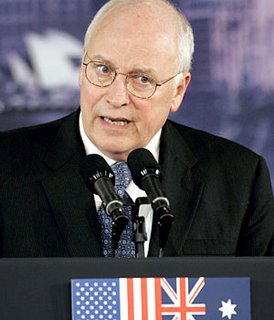 US Vice-President Dick Cheney has raised the possibility of military action to stop Iran acquiring nuclear weapons.
US Vice-President Dick Cheney has raised the possibility of military action to stop Iran acquiring nuclear weapons.He has endorsed Republican senator John McCain's proposition that the only thing worse than a military confrontation with Iran would be a nuclear-armed Iran.
LinkHere
Government forces kill 17 civilians in Baldruz / Haq Special Report.
 Haq Agency, www.76news.net
Haq Agency, www.76news.netOur Haq correspondent reports that Government Froces have engaged in a new butchery adding one more to a series of others, namely the killing of 17 people from the inhabitants of Shahat Ali in the Baldruz region, on 21.2.07. And here are the names of the victims: 1) Fandi Jassem Kaheet and his sons Raad and Saad (shia) 2) Hadi Jassem Kaheet and his sons Amr and Adham (shia) 3) Radhee Kanan Kaheet (shia) 4) Al Raheem Kanan Kaheet (shia) 5) Tareq Rasheed Al Shaheen and his sons Ahmed and Raad (sunni) 6) Adel Rasheed Al Shaheen (sunni) 7) Saadoon Rasheed al Shaheen (sunni) 8) Arkan Nomi and three of his sons (sunni). The government forces accused the above victims of being terrorists and their list of names clearly indicates they belong to both sects sunnis and shias.The government forces however did not stop at this massacre. They in fact accused another 5 innocent people of having conducted the above massacres, blaming it on them...
continua / continued





